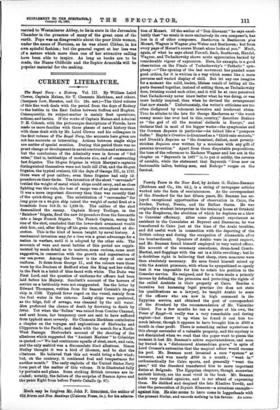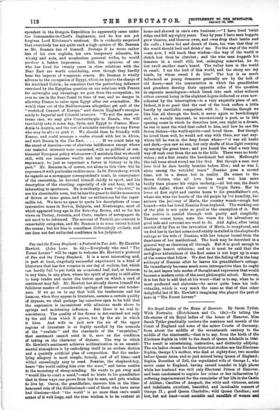Twenty Years in the Near East, by Ardern G. Hulme-Beaman
(Methuen and Co., 10s. Gd.), is a string of newspaper articles worked into the form of reminiscences. As the correspondent of the Standard for the last fifteen years, Mr. Beaman has en- joyed exceptional opportunities of observation in Cairo, the Soudan, Turkey, Russia, and the Balkan States. He was originally a student interpreter in the training house at Ortakeni on the Bosphorus, the abolition of which he deplores as a blow to Consular efficiency. After some pleasant experiences as assistant in the Consulates at Beyrout and Damascus, he was transferred to Cairo just at the time of the Arabi troubles, and did useful work in connection with the deporting of the British colony and during the occupation of Alexandria after the bombardment. Speakers of Arabic were in great request, and Mr. Beaman found himself employed in very varied office.. His account of the summary executions, drum-head Courts. Martial, and floggings with the cat is a little revolting; but he is doubtless right in believing that sharp, stern measures were then absolutely necessary. He soon found himself mixed up with the Arabist prisoners, with whom he sympathised so openly that it was impossible for him to retain his position in the Consular service. He resigned, and for a time made a princely income by defending the prisoners and protecting the rights of the exiled Arabists in their property at Cairo. Besides a lucrative but harassing legal practice (he does not state his qualifications as a lawyer), he taught Arabic to some of the officers who are now in high command in the Egyptian service, and obtained the post of correspondent of the Standard by the recommendation of Mr. Valentine Chirol. For a few months he ran a paper of his own, the Ttmes of Egypt—it really was a very remarkable and daring exploit—but threw it up when he found it cost him too much labour, though it appears to have brought him in £300 a month in clear profit. There is something rather mysterious in this abrupt surrender of a valuable property, and the mystery is not diminished when we read that the paper went to pieces the moment it lost Mr. Beaman's active superintendence, and soon lay buried in a "dishonoured Alexandrian grave," in spite of Lord Cromer's entreaties that the magical editor would resume his post. Mr. Beaman next invented a sure "system" at baccarat, and won nearly ..2700 in a month ; "went in" enthusiastically for Cairo sports, and generally "went the pace," till the Standard transferred him to more important duties at Belgrade. The Egyptian chapters, though somewhat ancient history, are the most vivid in the book. Mr. Beaman holds very decided opinions, and is not afraid of expressing them. He disliked and despised the late Khedive Tewfik, and cites the persecution of Zeyneb Khanum—a notorious example— against him. He also seems to have come to loggerheads with the present Sirdar, and records nothing in his favour. As corre • spondent in the Dongola Expedition he apparently came under the Commander-in-Chief's displeasure, and he has not yet forgiven Lord Kitchener's mistrust. He is evidently surprised that everybody has not quite such a high opinion of Mr. Beaman as Mr. Beaman has of himself. Perhaps if he wrote rather less of his own exploits, his own temporary ailments, his whisky and soda, and numberless personal trifles, he would produce a better impression. Still, the opinions of one who has lived for twenty years in close relations with the Near East are worth considering, even though they hardly bear the impress of temperate reason. Mr. Beaman is wholly adverse to the occupation of Egypt, which he lays to the charge of Sir Auckland Colvin ; he considers that the perturbing influence exercised by the Egyptian question on our relations with France far outweighs any advantage we gain from the occupation ; he sees no use in the Suez Canal in time of war, and no danger in allowing France to enter upon Egypt after our evacuation. He would clear out of the Mediterranean altogether, get quit of the "wretched Concert of Europe," and devote England's energies solely to Imperial and Colonial interests. "To put the most ex- treme ease, we may give Constantinople to Russia, who will inevitably take it some day, Syria and Egypt to France, Mace- donia to Austria, and the rest of available territory to any Power who may be able to grab it. We should then be friendly with France, and could arrange a mates vivendi with her in Africa, and with Russia in the Far East If we could take up the stand of America—one of absolute indifference except where our material interests were concerned, with no political or sen- timental European policy whatsoever—I maintain that we should still, with our immense wealth and our overwhelming naval supremacy, be just as important a factor in history as in the past." Mr. Beaman is, of course, not alone in this view, but he expresses it with particular recklessness. In St. Petersburg, which he regards as a newspaper correspondent's tomb, in consequence of the censorship, he devoted himself chiefly to sport, and his description of the shooting, especially of elk and bear, will be interesting to sportsmen. He is evidently a keen " shootist," to use his abominable term, but he has the grace to dislike massacres of driven or tame game, and has no enthusiasm for the caper- caillie tok. We have no space to quote his descriptions of some instructive tours in Servia, Bulgaria, and Montenegro, most of which appeared long ago in the Saturday Review, and as for his views on Turkey, Armenia, and Crete, readers of newspapers do not need to be informed. The account of Turkish government is remarkably outspoken, and Mr. Beaman is to some extent behind the scenes ; but his bias is sometimes distressingly evident, and one does not feel unlimited confidence in his judgment.



















































 Previous page
Previous page